AIR INDIA WILL reduce international service on widebody aircraft by 15 percent through at least mid-July, according to media reports. The decision comes less than a week after the June 12 crash of an Air India airliner carrying 230 passengers and 12 crew members in Ahmedabad, India, that killed 246 but left one survivor among the passengers.
The airline said the reduced service due to the safety inspection of aircraft and ongoing geopolitical tensions in the Middle East, which have disrupted operations, resulting in 83 flight cancellations over the past six days, according to ABC News. Passengers can either reschedule their flights at no additional cost or receive a full refund.
“The reductions arise from the decision to voluntary undertake enhanced pre-flight safety checks, as well as accommodate additional flight durations arising from airspace closures in the Middle East,” the airline said in a press release. “The objective is to restore schedule stability and minimizing last-minute inconvenience to passengers."
Air India also said 26 out of the 33 Dreamliners in its fleet have now been returned to service following the required safety inspections by the Directorate General of Civil Aviation, according to ABC. The airline also is performing "enhanced safety checks" on its Boeing 777 fleet as a precaution and is cooperating with authorities.
Air India flight AI171 went down in a crowded area near the airport shortly after takeoff. While the causes of the Ahmedabad crash are still under investigation, Reuters reported that India's Directorate General of Civil Aviation said spot checks in May on three Air India Airbus planes found that they were operated despite mandatory inspections being overdue on the "critical emergency equipment" of escape slides.
In one case, DGCA found that the inspection of an Airbus A320 jet was delayed by more than a month before being carried out on May 15, but data shows that during the delay the plane flew to several international destinations. Another case, involving an Airbus A319 used on domestic routes, according to Reuters, showed checks were over three months late, while a third showed an inspection was two days late.
"The above cases indicate that aircraft were operated with expired or unverified emergency equipment, which is a violation of standard airworthiness and safety requirements," the DGCA report said.













